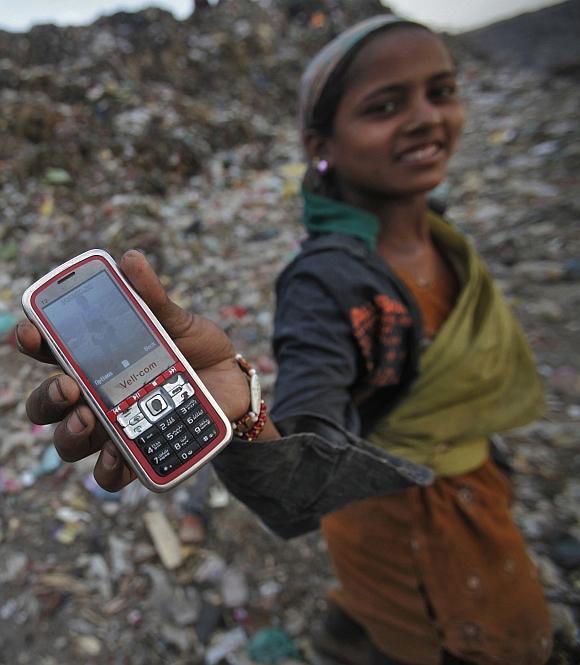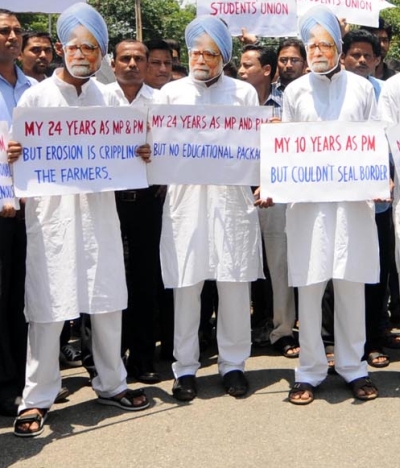 | « Back to article | Print this article |
When UPA almost announced free mobiles for poor...
After nine years in power, the United Progressive Alliance faces the question of credibility, says Aditi Phadnis
Around August 15, 2012, a proposal emanating from the Prime Minister's Office caused consternation among half a dozen secretaries to the Government of India who were asked for comments on it.
The suggestion was that from the ramparts of the Red Fort, Prime Minister Manmohan Singh would announce a scheme for free cell phones to all Below Poverty Line citizens. If mobile phone companies were roped in to provide subsidised service to the poor and the handsets were free, the appeal -- to the poor -- would be on a par with schemes like the Mahatma Gandhi National Rural Employment Guarantees Act, on the back of which the United Progressive Alliance returned to power in 2009.
With 18 months left for the general elections, officials reckoned the benefit of such a scheme would be two-fold: it would extend into the election year; and it would help in checking the damage caused by telecom-related corruption.
The idea was tossed around but abandoned after bureaucrats' horror: at the cost, the possible leakage, the possibilities of more corruption. The PMO gave up the idea reluctantly, pointing out that some states in the United States had rolled out such a scheme to great political advantage.
"Wait for something like that," said an official laconically. "With less than one year to go, the government is on the ropes. It knows it won't have to pay for such schemes. And, the temptation to spend public money to ensure another term in power is strong".
"We are going to have to fight anti-incumbency strongly," said a top Congress party politician. "This election is not going to be an easy one."
A minister conceded, "Yes, it won't be easy. But if we won't gain seats, the Bharatiya Janata Party won't gain any either".
Click NEXT to read further...
Desertion by four allies could cost Congress the elections
May 22 marks four years of the second term of the UPA. The customary anniversary dinner at the prime minister's residence will see at least two senior alliance partners -- the Dravida Munnetra Kazhagam and the Trinamool Congress -- missing from the dais. Six allies -- TMC, DMK, Telangana Rashtra Samithi, Viduthalai Chiruthaigal Katchi, Majlis-e-Ittehadul Muslimeen and Jharkhand Vikas Morcha -- have deserted it in the last four years, which could cost the Congress in the elections.
In 2004, the Congress got 146 MPs in the Lok Sabha. In 2009, it had 203. And yet, despite a stronger fulcrum, not only does the alliance lie in tatters, it is no less vulnerable to hectoring by allies now than it was in 2004.
An enfeebled UPA is also fighting for credibility after reeling from a series of corruption and manipulation charges, though many argue this is a function of incumbency. "No government can get everything right all the time. We may have made some mistakes, and we will have to deal with the consequences," said a party leader.
However, within the Congress, there is also acknowledgement that the party has never been less prepared to face an election. In several states, there is no party executive. In at least two, the post of the Pradesh Congress Committee chief lay vacant for months and has only now been announced.
In Andhra Pradesh, which gave the highest number of MPs to the Congress Legislature Party -- 33 -- ministers say the party will be lucky if it can win six ("I'm at a loss to say which six seats we will win, though" remarked a central minister elected from the state). In Uttar Pradesh, mauled in the assembly elections of 2012, the party's current tally of 22 Lok Sabha seats is likely to come down further.
Click NEXT to read further...
What has Rahul got to the table since elevated to VP?
The party's credibility has been eroded because it seems unable to implement any of the announcements made from party fora. A national training centre for workers is yet to come up, six months after the Jaipur Chintan Shivir, where it was first voiced in January 2012.
"Rahul Gandhi said that your money in your hands is definitely a political slogan. We are fully confident that we will move forward with it before 2014," Union minister Jairam Ramesh promised ahead of the Jaipur meeting. It is yet to be rolled out. In 2010, at the party's Burari plenary meeting, president Sonia Gandhi asked party chief ministers to renounce discretionary powers. Most chief ministers now say they never had such powers in the first place.
Although Rahul Gandhi has been elevated to vice-president, exactly what he has brought to the table is still an open question. The conventional wisdom is that four crucial assembly elections before the Lok Sabha elections -- Madhya Pradesh, Chhattisgarh, Rajasthan and Delhi -- are not likely to get the Congress an appreciable strike rate.
Click NEXT to read further...
Authority of PM is steadily diminishing
On the delicate issue of the relations between the prime minister and the Congress president, neither the party nor the government has been able to say the last word. Party general secretary Digvijaya Singh is on record as asserting that the system of two power centres hasn't worked. The party has been unable to defend the prime minister from attacks of the opposition that on the 2G spectrum scam and the coal block allocation scam, it was the prime minister who had constructive responsibility. Worse, the opposition has bluntly asserted that a former petroleum minister was replaced following pressure from a corporate house: no one in the government or party has contested this charge conclusively.
Buffeted by the Anna Hazare movement against corruption, country-wide protests against the gang-rape of a 23-year-old student in Delhi, beheading of two Indian soldiers on the border by Pakistan, aggressive incursions by the Chinese into Indian territory, torture and subsequent death of Indian prisoner Sarabjit Singh in a Pakistan jail, the slowness with which the government reacted to the corruption charges against railway minister Pawan Bansal -- it all points to one thing: the steady diminution of the authority of the prime minister.
Worse, the second tenure of UPA saw inflation (wholesale price index) rising from 4.47 per cent in 2005-06 to 8.94 per cent in 2011-12, and a decline in agriculture growth from 3.96 per cent to 2.5 per cent in the same period. Persistent high food inflation, high current account deficit, a ballooning trade deficit and charges of cronyism is the opposition's charge against an economist prime minister.
Click NEXT to read further...
Battling incumbency slip-ups, poor leadership UPA is losing steam
The government says this has led to the baby being thrown out with the bathwater: The Right to Education Act was enacted by UPA II, guaranteeing free compulsory education to all children below 14 has been washed away. Poverty estimates show a decline from 37.2 per cent (2004-05) to 29.8 per cent (2009-10).
"But allocations to the education sector have not exceeded 3.5 per cent of gross domestic product (GDP), even though the common minimum programme of the UPA had recommended at least six per cent investment of GDP in education," says social scientist Neera Chandoke. "Similarly, the 2013 World Bank report tells us that India continues to account for one third of the world's poor."
Battling incumbency slip-ups, poor leadership and lack of attention to detail, the UPA is losing steam. In the circumstances, announcement of populist schemes is a strong temptation, though one that the country can scarcely afford at this time. The remainder of the UPA-II's tenure will decide if it will take the easy way out.
TOP photo features of the week
Click on MORE to see another set of PHOTO features...






